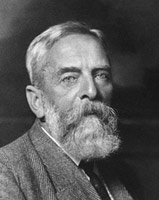



He succeeded Carl Menger as head of Economics at Vienna University in 1903. His works include the landmark Social Economics (1914).
Like his brother-in-law, Eugen von Boehm-Bawerk, von wieser was a convert to the field of economics – he was originally a student of jurisprudence – after reading Carl Menger’s Principles. Among von Wieser’s numerous contributions to the field was his revolutionary interpretation of cost: He showed how the value of production factors lies not only in the money spent, but on the opportunities missed by not spending that money on something else. This concept was later referred to as "opportunity cost" and became a central tenet of the Austrian School’s economic model.
Many dismissed Menger's theories as "subjectivist" and unscientific. But where others saw subjectivity, Menger saw the heart and soul of economics: individuals acting to satisfy their wants. It was this wholly natural impulse, according to the Principles, that dictated all economic activity, from trade to consumption to price systems.









